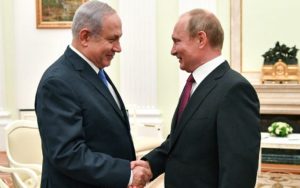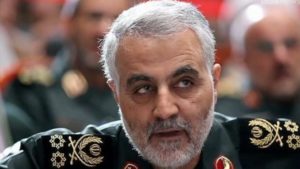Netanyahu Outfoxed Russia, Iran and ISIS With His Cynical, Ruthless Syria Policy

Binyamin Netanyahu and Vladimir Putin at their meeting in Moscow on 11 July
Anshel Pfeffer writes in Haaretz, ““Assad will be gone in weeks, perhaps even days,” predicted the ebullient veteran Israeli intelligence officer. It was October 2011 and the Syrian civil war that had begun seven months earlier with widespread protests calling for democracy had swiftly escalated to an armed insurgency, with large parts of the regime’s army defecting and forming the Free Syrian Army.”
“The unrest across the Middle East was still being called optimistically “the Arab Spring,” the long-serving presidents of Tunisia and Egypt had been toppled and in Libya, dictator Muammar Gaddafi had been murdered in the street by rebels. The departure of Syrian President Bashar Assad from the scene was both a realistic and highly satisfactory outcome.2
“One senior figure in the Israeli leadership felt otherwise. Prime Minister Benjamin Netanyahu had no sympathy for Assad Junior, but he was both skeptical of any assessment predicting his imminent downfall and worried about what would happen in Assad’s absence, if he should indeed be forced out. Netanyahu had never been enthusiastic about the Arab Spring, arguing during its early stages that after the spring would come an “Islamist winter.” …

Iranian general Quassem Solemani
“For eight years of war in Syria, Netanyahu has pursued a ruthless and cynical policy regarding Israel’s northern neighbor. It has also been prescient and effective. While there were those among his military and intelligence advisors who were in favor of Israel taking sides against the Assad regime, Netanyahu insisted on remaining on the sidelines. That doesn’t mean he shied away from acting in Syria, quite the opposite, but Netanyahu’s red-lines prescribed exactly when Israel would act: Specifically against convoys, depots and research centers that were directly connected to supplying and developing Hezbollah with advanced weapons, as well as against Hezbollah and Iranian efforts to establish a presence near Israel’s frontier on the Golan.”
“Netanyahu was prepared to go much further in these attacks than some of his generals thought prudent. When in January 2015, Israel attacked a group of senior Hezbollah and Iranian officers near the border – killing among others its commanders in Syria, Jihad Mughniyeh and Mohamad Issa, as well as a general of the Islamic Revolutionary Guards Corps – one IDF general observed that “we were on the brink of war.” But Netanyahu judged correctly that Iran was too invested in propping up the Assad regime to jeopardize that by escalating hostilities with Israel.” (more…)
